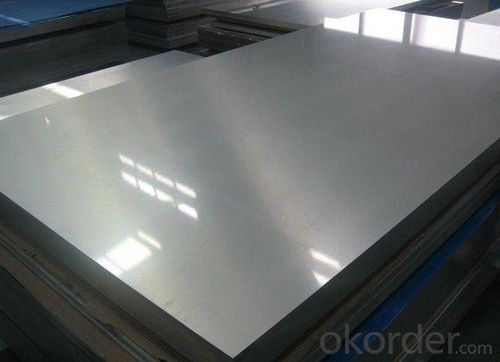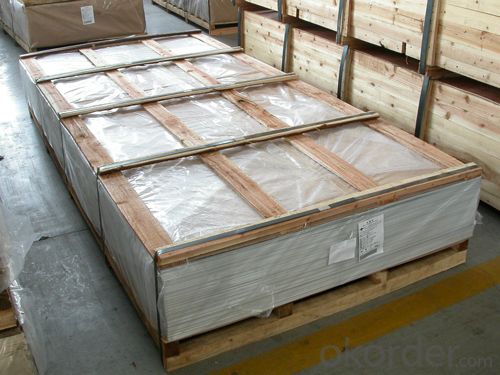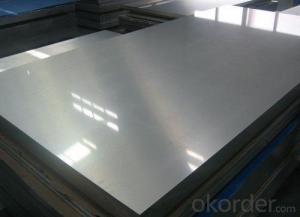3003 5052 Aluminium Plain Sheet Mill Finished
- Loading Port:
- China main port
- Payment Terms:
- TT OR LC
- Min Order Qty:
- 5 m.t.
- Supply Capability:
- 5000 m.t./month
OKorder Service Pledge
OKorder Financial Service
You Might Also Like
Item specifice
1. Description of 3003 5052 Aluminium Plain Sheet Mill Finished
| Alloy No. | Thickness (mm) | Width (mm) | Length (mm) | Temper | |
| A1050,A1060, A1070,A1100 | 0.2-100 | 20-2200 | 20-8000 | O,H12,H22,H14,H16,H18, H24,H26,etc | |
| A3003,A3105,A3004 | 0.2-100 | 20-2200 | 20-8000 | O,H14,H18,H24,etc | |
| A5052 ,A5005,A5083,A5754 | 0.2-100 | 20-2200 | 20-8000 | O,H18,H24,H32,H34,H111,H112 ,etc | |
| A6061,A6082,A6063 | 0.2-200 | 20-2200 | 20-8000 | T4,T6, T651,etc | |
| A8011 | 0.2-100 | 20-2200 | 20-8000 | O,H12,H22,H14,H16,H18,H24,H26, etc | |
| Packing : Export wooden pallets. The bundle wegiht not exceed 2MT. Loading:by 1x20GP, 1X20GP can load about 18MT | |||||
| Standards:ASTM-B209. EN573-1, GB/T3880.1-2006 | |||||
| Quality of material: totally free from defects like white rust, oil patches, roll marks, edge damage, camber, dents, holes, break lines, scratches and free from coil set | |||||
2. Application of 3003 5052 Aluminium Plain Sheet Mill Finished
Mainly used insigns, billboards, building exterior decoration, bus body, high-rise buildings and factories wall decoration, kitchen sink, lamp, fan leaves, with pieces of electronic, chemical equipment, sheet metal processing parts, deep drawing or spinning hollowware, welding parts, heat exchangers, bell surface and disk, plate, kitchenware, decorations, reflective devices, ect
3. Feature of 3003 5052 Aluminium Plain Sheet Mill Finished
*Such coil is specially designed to replace aluminum ingot, due to the high export tax of aluminum ingot, the coil has better price than ingot.
*This type of coil can fit customer's remelting furnace just like ingot, no need to make any change to the production line that was previously used for ingot. The standard coil size and weight is very suitable for the feed gate of furnace.
*This type of coil causes less material wastage than ingot when remelted.
*Our coil is made directly from ore, no need to go though the ingot making process, quality is much better than other suppliers who use ingot scrap to make coil.
Be free from Oil Stain, Dent, Inclusion, Scratches, Stain, Oxide Dicoloration, Breaks, Corrosion, Roll Marks, Dirt Streaks and other defect which will interfere with use
4. Certificate:
SGS and ROHS(if client request, paid by client), MTC(plant provided), Certificate of Origin(FORM A, FORM E, CO), Bureau Veritas and SGS (if client request, paid by client), CIQS certificate
5. Image of 3003 5052 Aluminium Plain Sheet Mill Finished


5. FAQ
1) What is the delivery time?
Dpends on actual order, around 20 days
2) What is the QC system:
We have QC staff of 20 persons and advanced equipment, each production is with MTC traced from Aluminum ingot lot.
3) What market do you mainly sell to?
Australia, America, Asia, Middle East, Western Europe, Africa etc
- Q:Can aluminum coils be used in automotive suspension systems?
- Automotive suspension systems can utilize aluminum coils. Aluminum, a lightweight and sturdy material, provides numerous advantages for suspension components. Its high strength-to-weight ratio allows it to handle heavy loads without burdening the vehicle with unnecessary weight. This can enhance fuel efficiency and overall performance. Furthermore, aluminum is resistant to corrosion, making it particularly valuable for automotive suspension systems exposed to harsh weather conditions and road debris. By incorporating aluminum coils, manufacturers can ensure that suspension components have a longer lifespan and require less maintenance. In addition, aluminum coils possess superior heat absorption and dissipation capabilities compared to materials like steel. This aids in preventing overheating and mitigating the risk of suspension failure, especially during intense driving conditions or off-road usage. However, it is important to note that the use of aluminum coils in automotive suspension systems may entail certain compromises. Although aluminum is lighter and more resistant to corrosion, it may not be as strong as steel. Therefore, manufacturers must meticulously design and engineer the suspension system to ensure it can withstand necessary loads and provide sufficient support and stability for the vehicle. In summary, aluminum coils can be effectively employed in automotive suspension systems, offering benefits such as lightweight construction, corrosion resistance, and efficient heat dissipation. Nevertheless, manufacturers must carefully consider the specific requirements and trade-offs associated with aluminum usage in suspension components to ensure optimal performance and safety.
- Q:What are the common handling and storage practices for aluminum coils?
- The common handling and storage practices for aluminum coils involve several key steps to ensure their integrity and prevent damage or degradation. 1. Protection from physical damage: Aluminum coils should be handled and stored in a way that minimizes the risk of physical damage. This includes using proper lifting equipment to avoid dropping or mishandling the coils, as well as storing them in a secure location away from potential hazards such as heavy machinery or sharp objects. 2. Proper stacking and support: When stacking aluminum coils, it is important to ensure that they are supported evenly and not overloaded. Excessive weight or uneven support can cause deformation or even collapse of the coils. The use of appropriate stacking equipment and supports, such as pallets or racks, is recommended to maintain the integrity of the coils. 3. Protection from moisture and corrosion: Aluminum is susceptible to corrosion, especially when exposed to moisture. Therefore, it is crucial to store aluminum coils in a dry environment to prevent the formation of rust or other forms of corrosion. Coils should be stored in a covered area or inside a warehouse to protect them from rain, snow, or excessive humidity. Additionally, wrapping the coils in a protective material, such as plastic or moisture-resistant packaging, can provide an extra layer of defense against moisture intrusion. 4. Temperature control: Extreme temperatures can impact the quality and performance of aluminum coils. It is recommended to store them in a temperature-controlled environment to prevent any adverse effects. Excessive heat can cause the coils to expand or distort, while extreme cold can make them more brittle and prone to cracking. Maintaining a stable temperature within the recommended range ensures the longevity and usability of the aluminum coils. 5. Handling and storage guidelines: It is essential to follow any specific handling and storage guidelines provided by the manufacturer or supplier of the aluminum coils. These guidelines may include recommendations on stacking height, weight limits, and any necessary precautions to prevent damage or deformation. Adhering to these guidelines will help maintain the quality and usability of the coils. By implementing these common handling and storage practices for aluminum coils, you can ensure their protection, integrity, and optimal performance throughout their lifespan.
- Q:How do aluminum coils contribute to improved indoor air quality?
- Aluminum coils play a crucial role in improving indoor air quality in various ways. Firstly, these coils are commonly used in air conditioning and HVAC systems, which are designed to circulate and filter the air inside buildings. The aluminum coils in these systems help in cooling and dehumidifying the air, reducing the moisture content that can promote the growth of mold and mildew. By controlling humidity levels, aluminum coils prevent the development of allergens and pollutants that thrive in damp environments, thus enhancing indoor air quality. Moreover, aluminum coils are highly efficient heat exchangers, allowing for effective transfer of heat between the air and the cooling or heating system. This efficiency enables HVAC systems to maintain a consistent temperature throughout the building, reducing the need for excessive energy consumption. By using less energy, these systems emit fewer harmful greenhouse gases, ultimately contributing to lower levels of outdoor air pollution and improving the overall air quality. Additionally, aluminum coils are durable and resistant to corrosion, which is essential for maintaining a clean and healthy indoor environment. The corrosion-resistant properties of aluminum coils ensure that there are no metallic particles or rust that can contaminate the air being circulated. As a result, occupants are less likely to inhale harmful particles that can cause respiratory issues and other health problems. Furthermore, aluminum coils are lightweight and often come with a protective coating, making them easier to clean and maintain. Regular cleaning of coils prevents the accumulation of dust, dirt, and other pollutants that may accumulate over time. By keeping the coils clean, the airflow is optimized, ensuring that the air being circulated is free from contaminants and allergens, thus promoting improved indoor air quality. In summary, aluminum coils contribute to improved indoor air quality by reducing humidity levels, preventing the growth of mold and mildew, enhancing energy efficiency, minimizing the emission of greenhouse gases, and maintaining a clean and contaminant-free air circulation system. These coils are an essential component of HVAC systems that play a vital role in creating a healthier and more comfortable indoor environment for occupants.
- Q:What are the common methods of joining aluminum coils together?
- Common methods of joining aluminum coils together include welding, soldering, adhesive bonding, and mechanical fastening. Welding is a popular method that uses heat to melt the aluminum and join the coils together. Soldering involves using a lower melting point filler metal to bond the coils. Adhesive bonding uses adhesives or glues to create a strong bond between the coils. Mechanical fastening involves using screws, bolts, or other mechanical devices to hold the coils together.
- Q:Can aluminum coils be used in high-altitude environments?
- Yes, aluminum coils can be used in high-altitude environments. Aluminum is a lightweight and corrosion-resistant material, making it suitable for various applications, including in high-altitude environments. Aluminum coils are commonly used in air conditioning systems, heat exchangers, and refrigeration units, which can function efficiently at high altitudes. Aluminum's high strength-to-weight ratio allows it to withstand the extreme conditions found at high altitudes, including low temperatures, high winds, and low atmospheric pressure. Additionally, aluminum is non-magnetic, which is advantageous in certain high-altitude applications, such as aerospace and satellite technologies. Furthermore, aluminum has excellent thermal conductivity, allowing it to efficiently transfer heat, making it ideal for use in cooling systems operating in high-altitude environments. Its corrosion resistance properties also make it durable and able to withstand the effects of moisture, which can be prevalent in such environments. Overall, aluminum coils are a reliable and suitable choice for use in high-altitude environments due to their lightweight, corrosion resistance, thermal conductivity, and strength.
- Q:Does anyone know if aluminum skateboards are good?
- aluminum skateboards are ok if your just olling and playing around on them. but if your a real skater you'll probably want to get a real one.
- Q:What are the thickness tolerances for aluminum coils?
- The specific grade and alloy of aluminum being utilized can cause variations in the thickness tolerances of aluminum coils. Typically, the range for tolerances in coil thickness is between +/- 0.003 and 0.015 inches (0.076 to 0.381 mm). Nevertheless, it is crucial to acknowledge that various industries and applications might possess their own distinct requirements and tolerances. To ascertain the precise thickness tolerances necessary for a particular application, it is advisable to refer to the appropriate industry standards or specifications.
- Q:Almost every restaraunt uses aluminium foils and polyehylene for packing foods - that you carry to home.How safe is this ?For how long would the temperature be mainitained ?and within what time if consumed and is it safe ?
- Yes, it's perfectly fine You want to get it refridgerated within 1-2 hours of consuming the food and only keep it for up to 3 days. After that toss it.
- Q:What is the hardness of aluminum coils?
- The hardness of aluminum coils can vary depending on factors such as the alloy used and the specific manufacturing process. However, in general, aluminum coils are known for their relatively low hardness compared to other metals.
- Q:How are aluminum coils processed for further fabrication?
- Aluminum coils are processed for further fabrication through a series of steps to transform them into various products. The first step is typically uncoiling the coil to separate it into individual sheets or strips. This can be done manually or through an automated process. Next, the coils undergo a surface cleaning process to remove any dirt, oil, or other contaminants. This is important to ensure proper adhesion and surface finish in the subsequent fabrication steps. The cleaning process may involve chemical treatments, rinsing, or mechanical brushing. After cleaning, the coils are often subjected to a pre-treatment process, such as chemical conversion coating or anodizing. These treatments improve the surface properties of the aluminum, providing better corrosion resistance, enhanced adhesion for coatings, and improved paint adhesion. Once the pre-treatment is complete, the coils are ready for fabrication. This can involve various techniques such as cutting, bending, stamping, or roll forming. Cutting can be done through shearing, sawing, or laser cutting, depending on the required dimensions and accuracy. Bending and forming are commonly used to shape the aluminum coils into desired profiles or structures. This can be achieved through press brakes, roll forming machines, or specialized bending equipment. Stamping is another popular method of fabrication, where the coils are pressed into specific shapes using dies and punches. This technique is commonly used in the production of automotive parts, household appliances, and electronics. Once the desired fabrication is complete, the coils may undergo additional surface treatments or coatings to provide protection or enhance their appearance. This can include painting, powder coating, or applying protective films. In conclusion, aluminum coils are processed for further fabrication through a series of steps including uncoiling, surface cleaning, pre-treatment, cutting, bending, stamping, and surface treatments. These processes allow for the transformation of the coils into various products with the desired properties and characteristics.
1. Manufacturer Overview |
|
|---|---|
| Location | |
| Year Established | |
| Annual Output Value | |
| Main Markets | |
| Company Certifications | |
2. Manufacturer Certificates |
|
|---|---|
| a) Certification Name | |
| Range | |
| Reference | |
| Validity Period | |
3. Manufacturer Capability |
|
|---|---|
| a)Trade Capacity | |
| Nearest Port | |
| Export Percentage | |
| No.of Employees in Trade Department | |
| Language Spoken: | |
| b)Factory Information | |
| Factory Size: | |
| No. of Production Lines | |
| Contract Manufacturing | |
| Product Price Range | |
Send your message to us
3003 5052 Aluminium Plain Sheet Mill Finished
- Loading Port:
- China main port
- Payment Terms:
- TT OR LC
- Min Order Qty:
- 5 m.t.
- Supply Capability:
- 5000 m.t./month
OKorder Service Pledge
OKorder Financial Service
Similar products
New products
Hot products
Related keywords



























